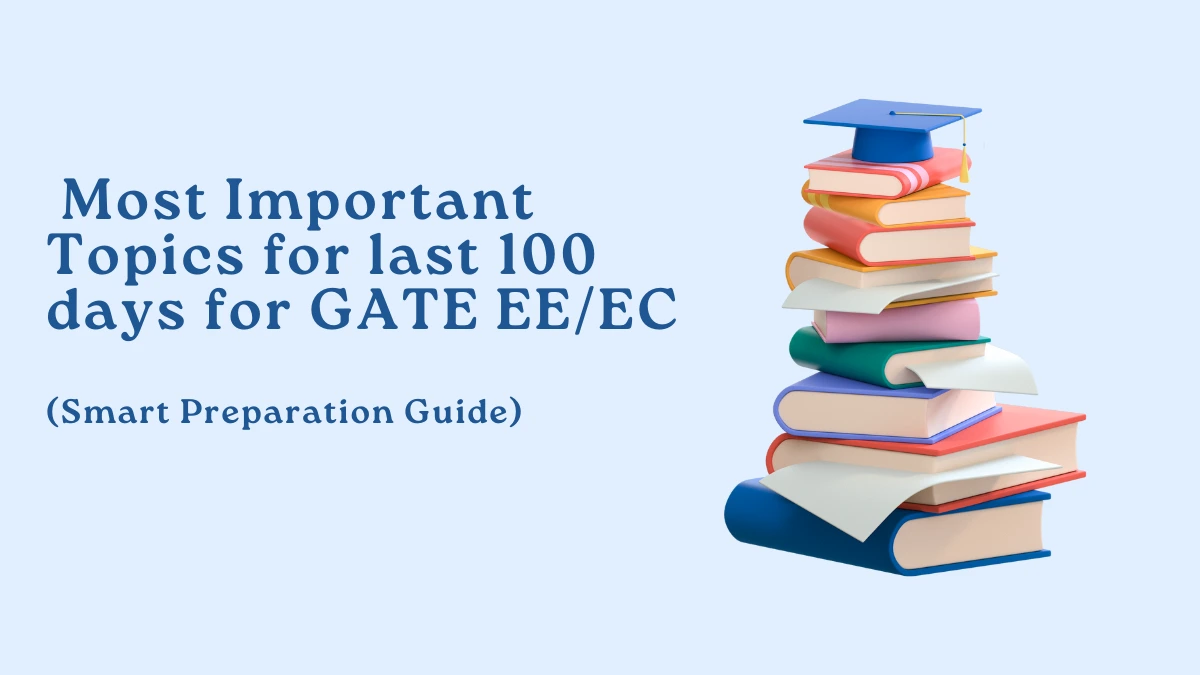Most Important Topics for last 100 days for GATE EE/EC 2026 – Smart Preparation Guide
Preparing for GATE Electrical (EE) or Electronics & Communication (EC) can feel overwhelming — with vast syllabi, complex formulas, and intense competition. But smart preparation begins with knowing where to focus. In this guide, we will break down the most important subjects and high-weightage topics based on the last 10 years’ GATE analysis to help you plan strategically.
If you are wondering how to prepare for GATE EE 2026 in 100 days or how to prepare for GATE EC 2026 in 3 months, this structured plan will help you use your remaining days efficiently.
For GATE Electrical Engineering (EE)
Electrical Machines (10–12 Marks)
One of the core pillars of EE. Every year, at least 8–12 marks are asked directly or indirectly from this area.
Key Topics:
- DC machines (EMF equation, torque, characteristics)
- Transformers (equivalent circuit, efficiency, voltage regulation)
- Induction motors (torque-slip characteristics, equivalent circuit)
- Synchronous machines (V-curves, power-angle characteristics)
💡 Tip: Focus on conceptual understanding — questions often test fundamentals rather than heavy calculations.

Power Systems (8–10 Marks)
Questions are conceptual and numerical, with steady trends over the years.
Key Topics:
- Transmission line parameters (ABC constants, Ferranti effect)
- Fault analysis (symmetrical & unsymmetrical faults)
- Load flow & stability analysis
- Compensation Techniques & Economic Operation
💡 Tip: Practice solving numerical questions on fault currents and voltage regulation under time constraints.
If you are following a smart GATE 2026 preparation strategy for EE/EC, mastering Power Systems early gives you a strong edge.
Control Systems (6–8 Marks)
A conceptual and scoring subject if practiced well.
Key Topics:
- Time & frequency domain analysis
- Bode plot and Nyquist criteria
- Root locus & system stability
- Transfer functions and state-space representation
💡 Tip: Revise Routh-Hurwitz and frequency response plots regularly.
Read More: How to Maximize your GATE Score?
Power Electronics (6–8 Marks)
Essential for both theory and application-based questions.
Key Topics:
- Diode and thyristor circuits
- Inverters (Voltage Control)
- Choppers (Buck, Boost & Buck-Boost Converters)
- Rectifiers (Full wave converters, Effect of Source Inductance)
- Commutation techniques
💡 Tip: Focus on waveform analysis and average/rms output voltages.
This subject is crucial if you are following the best GATE 2026 preparation guide for EE and EC.
Electrical Circuits & Networks (8–10 Marks)
A fundamental yet high-scoring area.
Key Topics:
- Thevenin’s & Norton’s theorem
- Resonance (series & parallel)
- Transient response of RL, RC, RLC circuits
- Two-port networks
💡 Tip: Practice questions involving complex frequency domain and impedance calculations.
Read More: 100 Days GATE Preparation Strategy
Analog & Digital Electronics (6–8 Marks)
A mix of circuit design and logic design questions.
Key Topics:
- Op-amp circuits & configurations
- Logic gates, flip-flops, counters, multiplexers
- Boolean simplification & K-map
💡 Tip: Expect application-based MCQs requiring logic simplification.
Electromagnetic Fields (4–6 Marks)
Though concept-heavy, the same patterns repeat.
Key Topics:
- Coulomb’s law, Gauss’s law, Ampere’s law
- Magnetic circuits
- Maxwell’s equations
💡 Tip: Revise vector calculus and field theory basics thoroughly.
Engineering Mathematics & Aptitude (15–18 Marks Combined)
Often the rank-decider section!
Mathematics Key Topics:
- Linear Algebra, Calculus, Differential Equations
- Probability & Statistics, Laplace Transform, Fourier Series
Aptitude Key Topics:
- Data interpretation, reasoning, and verbal skills
💡 Tip: Do daily 15-minute aptitude practice – it boosts your overall rank.
Remember, the most expected topics for GATE 2026 Electrical include Electrical Machines, Power Systems, and Engineering Mathematics — your core scoring areas for a 100-day GATE EE study plan.
For GATE Electronics & Communication (EC)
If you are exploring how to prepare for GATE EC 2026 in 3 months, focus on high-yield areas and conceptual clarity.
Networks, Signals, and Systems (10–12 Marks)
- Circuit analysis, transient response, frequency response
- Laplace & Fourier transforms
- Convolution, Z-transform, sampling theorem
Control Systems (6–8 Marks)
- Transfer functions, stability, Bode & Nyquist plots
Analog Circuits (10–12 Marks)
- Diode, BJT, MOSFET amplifiers, feedback & oscillators
Digital Circuits (8–10 Marks)
- Logic design, counters, sequential circuits, ADC/DAC
Communication Systems (8–10 Marks)
- AM/FM modulation, PCM, digital communication, noise
Electromagnetics (6–8 Marks)
- Waveguides, antennas, Maxwell’s equations
Electronic Devices (6–8 Marks)
- PN junctions, diodes, transistors, biasing
Mathematics & Aptitude (15–18 Marks)
Never ignore these! They add crucial marks with minimal effort.
The most expected topics for GATE 2026 Electronics revolve around Analog Circuits, Communication Systems, and Mathematics — make these your core revision areas for a 3-month GATE EC study plan.
Read More: Macaulay Double-Integration Method
Final Strategy
✅ Analyze Previous Year Papers: Focus on repetitive concepts.
✅ Prioritize Weightage: Start with high-yield subjects first.
✅ Mock Tests: Take full-length and subject-wise tests weekly.
✅ Short Notes: Maintain formula sheets and concept maps for last-minute revision.
✅ Time Management: Balance technical and non-technical subjects smartly.
If you follow this plan, you’ll be right on track for a top 100 rank in GATE 2026 with a smart GATE 2026 preparation strategy for EE/EC.
Conclusion
Success in GATE EE/EC isn’t just about studying everything — it’s about studying the right things efficiently. Prioritize high-weightage subjects, strengthen your fundamentals, and practice consistently.
Remember, GATE rewards clarity of concepts more than memorization.
So start today — plan smart, practice daily, and power your way to a Top 100 rank in GATE 2026 with this smart GATE 2026 preparation guide for EE and EC!
FAQs – Important GATE EE EC Topics
How to prepare for GATE EE 2026 in 100 days?
Start with high-weightage subjects like Electrical Machines, Power Systems, and Mathematics. Divide your time into 60% concept-building, 30% practice, and 10% revision.
How to prepare for GATE EC 2026 in 3 months?
Focus on core topics: Analog Circuits, Communication Systems, and Networks. Revise formulas daily and take one mock test every 3–4 days.
What are the most expected topics for GATE 2026 Electrical?
Electrical Machines, Power Systems, Control Systems, and Engineering Mathematics.
What are the most expected topics for GATE 2026 Electronics?
Analog Circuits, Digital Circuits, Communication Systems, and Electronic Devices.
What is the best GATE 2026 preparation guide for EE and EC?
A balanced plan focusing on topic weightage, mock tests, and conceptual clarity. Use previous year papers and analyze repeated question patterns.
What is the smart GATE 2026 preparation strategy for EE/EC toppers?
Toppers recommend creating 3 phases — concept clarity, practice, and revision — while maintaining consistency in daily problem-solving and mock analysis.







